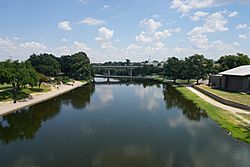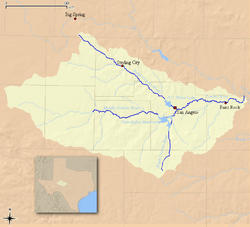Concho River facts for kids
Quick facts for kids Concho River |
|
|---|---|

The Concho River in San Angelo, Texas
|
|

Map of the Concho River and associated watershed
|
|
| Other name(s) | Río Concho |
| Country | United States |
| State | Texas |
| Counties | Concho and Tom Green |
| Physical characteristics | |
| River mouth | 1,480 ft (450 m) 31°34′17″N 99°43′29″W / 31.57139°N 99.72472°W |
The Concho River is a river located in the state of Texas, United States.
The name Concho comes from the Spanish word for "shell." The river got this name because it used to have many freshwater mussels. One type was the Tampico pearly mussel.
Contents
Exploring the Concho River's Path
The Concho River has three main parts. These are the North, Middle, and South Concho Rivers. The South Concho River is special because it is the only river in Texas that flows north.
Where the River Begins and Ends
The North Concho River is the longest part. It starts in Howard County. It flows southeast for about 88 miles (142 km).
It then joins with the South and Middle forks. This meeting point is near Goodfellow Air Force Base in San Angelo, Texas.
The combined river then flows east for about 58 miles (93 km). It eventually empties into the Colorado River. This happens within the waters of the O.H. Ivie Lake. This lake is about 12 miles (19 km) east of Paint Rock, Texas.
A Look Back: History of the Concho River
The Concho River has an interesting history, especially concerning pearls.
Spanish Expeditions and Pearls
In 1650, an expedition was sent from Santa Fe. It was led by Captain Diego del Castillo. This group explored what is now north central Texas.
They reached the land of the Tejas Indians. They reported finding pearls in the Concho River. Because of this discovery, another expedition was launched in 1654. This was called the Diego de Guadalajara expedition.
The Spanish explored the river looking for special purple to pink pearls. These pearls came from the mussels in the river. However, they soon stopped harvesting them. They realized there were not enough pearls to make it worth the effort.
See also
 In Spanish: Río Concho para niños
In Spanish: Río Concho para niños
 | Selma Burke |
 | Pauline Powell Burns |
 | Frederick J. Brown |
 | Robert Blackburn |

